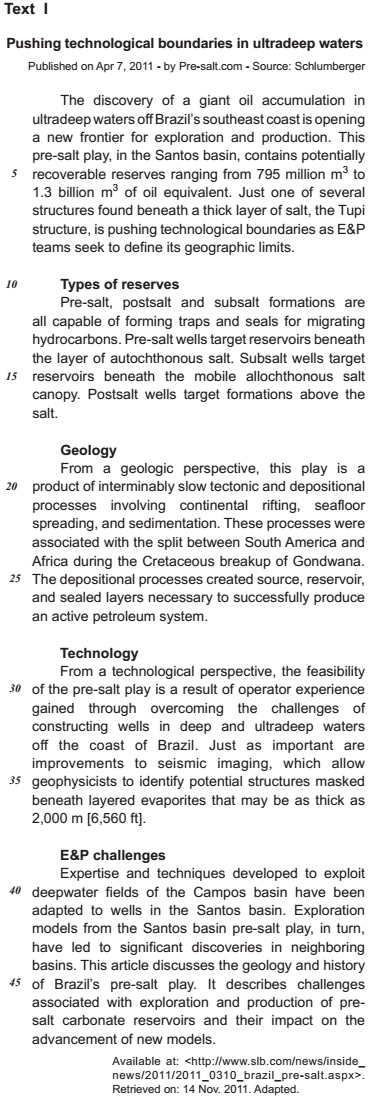Questões de Inglês - Sinônimos | Synonyms para Concurso
Foram encontradas 1.237 questões
Making Performance Budgeting Work: New IMF Book
October 04, 2007
Member countries will find valuable advice on how to reform their budgeting practices to improve the effectiveness and
efficiency of public expenditure in a major new work on performance budgeting produced by the Fiscal Affairs Department. The book,
Performance Budgeting: Linking Funding and Results (500pp), came off the presses of the top UK publisher Palgrave Macmillan in
September.
Edited by FAD staff member Marc Robinson, the book contains a comprehensive treatment of contemporary performance
budgeting practice and theory. In a series of thematic chapters and case studies, the book discusses:
- The key forms of performance budgeting which [TO IMPLEMENT] around the world - how they differ, and what they have in
common points.
- Lessons from the experience of governments around the world - ranging from OECD nations to developing, middle-income
and transition countries - about what forms of performance budgeting work, under what circumstances, and with what
implementation strategies.
- How successful performance budgeting can improve aggregate fiscal discipline.
- The information requirements of performance budgeting, and
- The links between performance budgeting and other budgeting and public management reforms.
Many of the contributors to this work are leaders in performance budgeting implementation in their countries. Others are
respected academics and technical experts from the International Monetary Fund and other international organizations. Countries
covered in the case studies include the UK, USA, Australia, France, Chile, Spain, Russia, Colombia and Ethiopia.
One major focus of the book is performance budgeting as a tool for improved expenditure prioritization - that is, for helping to
shift limited public resources to the services of greatest social benefit. A key finding is that this type of performance budgeting will only
work if the budget process is fundamentally changed so that top politicians and bureaucrats systematically consider expenditure
priorities when formulating the budget. This means more than just considering the priorities for new spending. It requires also having
mechanisms to systematically review existing spending programs to identify what is ineffective and low priority and can, therefore, be
cut. This is what countries such as Chile and the United Kingdom have successfully done, and the United States is currently attempting
to achieve with its Program Assessment Rating Tool instrument. Conversely, it is a mistake to believe that merely changing the budget
classification and developing performance indicators will in itself improve the allocation of resources in the budget.
(Adapted from http://blog-pfm.imf.org/pfmblog/2007/10/making-performa.html)
I. Making Performance Budgeting Work
II. ... is a major new work...
Leia as sentenças abaixo:
- This work is protected under copyright laws and reproduction is strictly prohibited.
- Institutions such as the rule of law will rarely work if they are simply copied from abroad.
- Theory of the Firm builds models to help explain how markets work.
- His new book is called " Making Our Democracy Work: A Judge's View."
- She wanted it to be the definitive work on the subject of voting and women's rights around the world.
A alternativa que representa a ordem correta em que os sentidos aparecem no conjunto das sentenças é


Oil is the largest source of liquid fuel and, in spite of attempts to develop synthetic fuels, world consumption of oil
products in increasing.
The oil industry is not much more than a hundred years old. It began when the first oil well was drilled in 1859. In the
early days, oil was used to light houses because there was no electricity and gas was very scarce. Later, people began to use oil
for heating too.
Most industries use machinery to make things. Every machine needs oil in order to run easily. Even a small clock or watch
needs a little oil from time to time.
The engines of many machines use oil fuels petrol, kerosene or diesel. Cars, buses, trucks, tractors, and small aircraft use
petroleum chemicals: synthetic rubber, plastics, synthetic fiber materials for clothes and for the home, paints, materials which
help to stop rust, photographic materials, soap and cleaning materials (detergents), drugs, fertilizers for farms and gardens, food
containers, and may others.
In 1900 the world’s oil production was less than 2 million tons a year. Today the oil industry is one of the world’s largest
and most important suppliers of raw materials.

